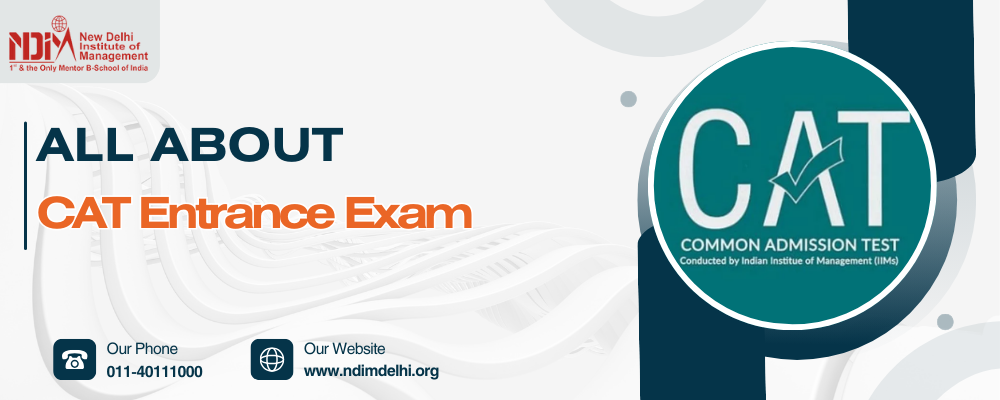CAT Exam Full Form
Cat stands for Common Admission Test. It is a national-level entrance exam conducted by the Indian Institutes of Management (IIMs).CAT Exam is conducted for the purpose of admission to postgraduate management programs, such as MBA (Master of Business Administration), offered by various prestigious business schools and management institutes in India. Students aspiring to study business management target the top B-schools. Admission to these prestigious B- Schools typically requires taking the CAT entrance exam, followed by a personal interview and group discussion. To realize your ambition of studying business management and gaining admission to your desired B-school, thorough preparation for the Common Admission Test (CAT) is crucial. Here’s an overview of CAT and what it entails:
What is CAT Exam ?
CAT is a competitive examination designed to assess students’ aptitude and profile, with the aim of shortlisting candidates based on merit. This computer-based test is conducted annually and serves as a gateway to some of the finest management schools in India. Success in the CAT exam can unlock opportunities for postgraduate, and executive management programs. It evaluates candidates across various domains such as Quantitative Ability (QA), Verbal Ability and Reading Comprehension (VARC), and Data Interpretation and Logical Reasoning (DILR). The objective is to identify individuals with the potential to excel in management education and become future leaders.
Cat Exam Eligibility
Know CAT Eligibility Criteria in the below provided section before register for exam:
- Qualifying Degree: Applying candidate must hold Bachelor’s degree secured by recognised University or possess an equivalent qualification recognised by Ministry of Education, Govt of India.
- Minimum Marks: Candidates must have obtained atleast of 50% marks for General/EWS/ OBC-NC (45% in case of ST/ SC/ PWD) in their qualifying degree. The percentage of marks secured by students will be calculated based on practices followed by the respective Institution/ University.
- Appearing: Those candidates appearing in the final year of Bachelor’s degree or its equivalent / awaiting their results can also apply.
- IIMs Criteria: Students must note that IIMs will verify the eligibility of candidates at various stages during the selection process. So, mere fulfilment of basic eligibility will not ensure admission into IIMs.
- Candidates must have a bachelor’s degree in any discipline from a recognized university or institute.
- Candidates in their final year of graduation can also apply.
- There is no age limit for appearing in CAT.
CAT Exam For ?
This CAT Exam is the most sought-after among all MBA entrance tests held every year. The pursuit of the MBA diploma from a well-known institution is a goal for many hopefuls. Candidates wishing to apply for admission for MBA programs should take exams like the CAT Exam.
Application Invited for PGDM 2025 at NDIM
CAT Exam – Gateway to India’s Premier Management Institutes
- The CAT exam is a standardized entrance exam conducted by the IIMs for postgraduate management programs.
- It assesses verbal ability, quantitative ability, data interpretation, and logical reasoning skills.
- The exam comprises three sections: VARC, QA, and DILR.
- Only a small percentage of candidates secure seats in IIMs.
- Tips for preparation include starting early, creating a study plan, using quality materials, practicing regularly, and staying focused.
CAT Exam Structure and Pattern
The CAT exam is divided into three sections, each designed to test different skills:
- Quantitative Ability (QA): This section assesses a candidate’s numerical and mathematical skills. It includes questions on arithmetic, algebra, geometry, number systems, and modern mathematics.
- Verbal Ability and Reading Comprehension (VARC): This section evaluates a candidate’s proficiency in the English language, focusing on grammar, vocabulary, sentence correction, and reading comprehension passages.
- Data Interpretation and Logical Reasoning (DILR): This section measures a candidate’s ability to interpret data presented in various forms such as tables, graphs, and charts, along with logical reasoning skills through puzzles, seating arrangements, and logical sequences.
The exam duration is 180 minutes, with 60 minutes allotted for each section. Candidates must answer the questions in a specific order, as switching between sections is not allowed.
CAT Exam Syllabus
Understanding the CAT exam syllabus is essential for effective preparation. Here’s a detailed breakdown:
Quantitative Ability (QA)
- Arithmetic: Percentages, profit and loss, time and work, time, speed and distance, averages, ratios, and proportions.
- Algebra: Linear and quadratic equations, inequalities, sequences and series, functions, and graphs.
- Geometry: Lines, angles, triangles, circles, polygons, and coordinate geometry.
- Number Systems: Divisibility rules, prime numbers, HCF and LCM, integers, and modular arithmetic.
- Modern Mathematics: Permutations and combinations, probability, set theory, and trigonometry.
Verbal Ability and Reading Comprehension (VARC)
- Reading Comprehension: Passages from various genres, including economics, sociology, literature, and science, followed by questions testing comprehension and inference.
- Verbal Ability: Grammar and usage, sentence correction, jumbled paragraphs, paragraph summary, and completion.
Data Interpretation and Logical Reasoning (DILR)
- Data Interpretation: Interpretation of data from tables, graphs, and charts, including bar graphs, pie charts, line graphs, and Venn diagrams.
- Logical Reasoning: Puzzles, seating arrangements, blood relations, syllogisms, logical sequences, and binary logic.
Preparation Tips for the CAT Entrance Exam
To excel in the CAT exam, a structured and disciplined preparation approach is crucial. Here are some tips to help you get started:
- Understand the Exam Pattern: Familiarize yourself with the CAT entrance exam pattern and CAT exam syllabus by taking a mock exam. Understand the weightage of each section and the types of questions asked.
- Create a Study Plan: Develop a study plan that covers all the topics systematically. Allocate sufficient time for each section and ensure regular revisions.
- Practice Regularly: Consistent practice is key to success. Solve previous years’ CAT papers and take mock tests to get a feel of the actual exam environment.
- Focus on Weak Areas: Identify your weak areas and work on improving them. Seek help from mentors or join coaching classes if necessary.
- Time Management: Develop effective time management skills to ensure you can answer all the questions within the given time frame. Practice solving questions under timed conditions.
- Read Extensively: Improve your reading speed and comprehension skills by reading newspapers, magazines, and books. This will also help in enhancing your vocabulary and grammar.
- Stay Updated: Keep yourself updated with current affairs, especially topics related to economics, business, and politics, as they are often included in the reading comprehension passages.
- Stay Healthy: Maintain a healthy lifestyle, get enough sleep, and exercise regularly to keep your mind and body fit for the rigorous preparation.
Post-Exam Process
After the CAT entrance exam, results are typically announced in January. Scores are based on performance in each section, with both sectional and overall percentiles calculated. These scores are utilsed by top B-schools to shortlist candidates for the subsequent stages of the selection process, which usually include:
- Written Ability Test (WAT): Candidates write an essay on a given topic/case study to assess their written communication skills and clarity of thought. The implementation of the WAT varies by institution, as some colleges may choose not to conduct this exam.
- Group Discussion (GD): Candidates engage in a discussion on a given topic, where their communication skills, leadership qualities, and ability to work in a team are evaluated. Implementation of GD varies by institution, as some colleges may choose not to conduct this exam.
- Personal Interview (PI): A mandatory process conducted by all the B-schools, the PI involves a panel of interviewers assessing the candidate’s personality, academic background, work experience, and overall suitability for the management program.
CAT Exam 2024 Highlights |
|
| Name of the Exam | Common Admission Test (CAT) |
| CAT Official Website | https://iimcat.ac.in/ |
| Exam Duration | 2 hours |
| CAT Exam Fees |
|
| Medium of Exam | English |
| Mode of Exam | Computer Based Test (CBT) |
| CAT Exam Question Type | MCQ and Non-MCQ questions |
| Syllabus |
|
| Eligibility |
|
Conclusion
The CAT entrance exam is a gateway to some of the best business schools in India, offering a plethora of opportunities for those aspiring to build a successful career in management. With a well-structured preparation strategy, dedication, and consistent practice, you can navigate the challenges of the exam and achieve your desired score.
CAT Exam Centres List 2024: City List
Remember, success in the CAT entrance exam is not just about hard work but also about smart work. Focus on your strengths, work on your weaknesses, and maintain a positive attitude throughout your preparation journey.
After completing your entrance journey, selecting the right management college is crucial. NDIM stands out as a premier B-school located in the heart of Delhi, boasting a legacy of nearly three decades. It is the first and only mentor B-school offering dual specialization, equipping students to secure jobs in diverse fields.
NDIM is the premier choice for students aiming to pursue PGDM and enhance their skills, offering exceptional training for success in the dynamic business world. With distinguished faculty and top-notch facilities, NDIM delivers robust academic programs that promote holistic development for every student. Choosing NDIM over traditional business schools provides prime access to sought-after internships and significant professional growth opportunities, ensuring an enriching and comprehensive educational experience for ambitious learners. For more details, visit our website: https://www.ndimdelhi.org/
CAT is a competitive examination designed to assess students’ aptitude and profile, with the aim of shortlisting candidates based on merit. CAT is a computer-based examination conducted by IIM to shortlist candidates for the postgraduate programme.
The full form of CAT is the Common Admission Test.
Students aspiring to study business management target the top B-schools. Admission to these prestigious B- Schools typically requires taking the CAT entrance exam, followed by a personal interview and group discussion.
CAT is a computer-based examination conducted by IIM. and the Duration of exam is 3 Hours.
CAT Exam Fees for Reserved categories is INR 1200 (Reserved categories) and rnINR 2400 for General Other categories.
The full form of CAT is the Common Admission Test. CAT is a competitive examination designed to assess students’ aptitude and profile, with the aim of shortlisting candidates based on merit. This computer-based test is conducted annually and serves as a gateway to some of the finest management schools in India.
It evaluates candidates across various domains such as Quantitative Ability (QA), Verbal Ability and Reading Comprehension (VARC), and Data Interpretation and Logical Reasoning (DILR). The objective is to identify individuals with the potential to excel in management education and become future leaders.
the cat exam Fees CAT Exam Fees for INR 1200 (Reserved categories) INR 2400 (Other categories).
Eligibility for the cat exam 2024 is Bachelor’s Degree with 50% aggregate(45% aggregate or equivalent for reserved categories).
NO, The CAT entrance exam is a gateway to some of the best business schools in India Not for all MBA courses.
No, Class 12th marks are not required for CAT exam but Eligibility for the cat exam 2024 is Bachelor’s Degree with 50% aggregate. however, IIMs consider the 12th percentage as a selection criteria for MBA admissions
There is no limit or maximum attempts for CAT exam, so you can take the exam every year as long as you match the eligibility criteria.
This CAT Exam is the most sought-after among all MBA entrance tests held every year. The pursuit of the MBA diploma from a well-known institution is a goal for many hopefuls. Candidates wishing to apply for admission for MBA programs should take exams like the CAT Exam.
Student have Bachelor’s Degree with 50% aggregate.(45% aggregate or equivalent for reserved categories) are Cat Exam Eligibility.


